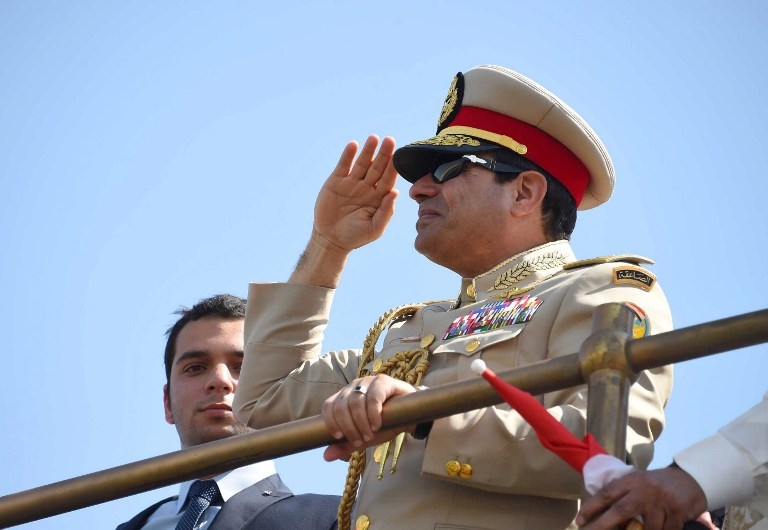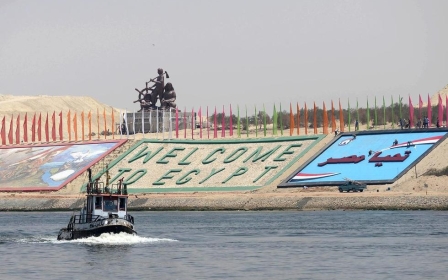Egyptian president says costs of new Suez Canal already recouped

Egyptian president Abdel Fatah al-Sisi announced in a televised speech on Sunday night that Egypt has already recouped the billions of pounds it spent expanding the Suez Canal.
“The canal cost 20 billion [Egyptian] pounds [to dig]…I am telling you now… with God’s grace, the total tonnage going through the Canal has increased from between 45-47 ships to between 60-63 ships coming from the Mediterranean every day,” Sisi told an audience of high-ranking government and military officials at an educational seminar in Cairo organised by the Armed Forces.
“This means that the 20 billion pounds that were spent building the canal have been compensated,” he said.
“I am telling you the truth,” said Sisi with a reassuring tone as the audience applauded loudly.
Sisi went on to compare the project to building a new metro line, which he said would have also cost the country 20 billion Egyptian pounds, but would not have been as profitable of an investment, he suggested.
“One metro line alone costs 20 billion pounds. We ask ourselves, what benefits has this metro given to us? I am happy we’re asking these questions, to see whether this fiscal amount has any benefits or detriments. This shows that the Egyptian people want to know what they’ll get as a result,” said Sisi.
It was not immediately clear why Sisi suggested in his comments that the canal cost 20 billion Egyptian pounds ($2.5bn) as media outlets have reported that the government spent three times that sum at 64 billion Egyptian pounds ($8.2bn) to complete the project, much of it paid for by state-issued bonds.
Major national accomplishment
The Suez extension was announced by Sisi a year ago and billed as a major national accomplishment, on par with President Gamal Abdel Nasser's nationalisation of the Suez Canal in 1956 and the building of the Aswan Dam.
On 6 August, Sisi celebrated the biggest expansion of the canal since it first opened in 1869 after ordering the expansion to be completed in 12 months instead of the three years which the project's engineers reportedly wanted.
The project allows for two-way traffic and reduces transit time across the closest link between Asia and Europe from 18 to 11 hours, according to the canal operator.
The Suez Canal Authority said it expects a windfall of additional revenue to come in over the long term - $13.23bn annually by 2023 compared with $5.3bn in 2014 – if the number of daily vessels rises from 49 to 97 over the same period.
According to Neil Davidson, senior analyst at Drewry, a specialist research and advisory organisation for the maritime sector, the canal generates direct revenue through charging a toll on ships that pass through. Indirect, secondary benefits that can be generated from the canal are much longer-term economic activities including manufacturing and warehousing.
The project included the digging of a 35km parallel waterway that flanks the existing 145-year-old waterway and the deepening and widening of 37km of the existing canal. This will cut transit times and allow larger vessels easier passage.
“This is Egypt’s gift to the world. We promised and we delivered,” Admiral Mohab Mameesh, the retired commander-in-chief of the Egyptian navy and chairman of the state-owned
Individual ships passing through the canal pay a few hundred thousand dollars in toll fees, generating the Suez Canal Authority billions of dollars a year, Davidson said.
But while Egypt may generate a huge sum of money annually through the canal, the economic benefits yielded by the expansion depend on an increase in the number ships passing through. It is unlikely there has been a significant increase in this number since the canal's inauguration earlier this month, Davidson said.
"In the very short term it would be business as usual for the canal. The amount of traffic would be very similar to what it would normally be [before the expansion]," said Davidson.
"In the past couple of weeks . . . I don’t see that there would be any additional revenue that quickly," he added.
Critical reception
Several analysts and observers, have been critical of the economic benefits the expansion would bring to Egypt.
“From a shipping industry point of view, this initiative to expand the Suez canal was a bit of a surprise,” Ralph Leszczynski, Singapore-based head of research at Genoese shipbroker Banchero Costa & Co told Bloomberg.
“There was no pressing need or requests for this as far as I’m aware.”
“'Build it and they will come’ is not enough,” Simon Kitchen, a strategist with Cairo-Based investment bank EFG-Hermes told Bloomberg. “The government needs to give ships a reason to sail through the canal,” he said.
Though total tonnage has increased since a global financial crisis caused shipping to plummet in 2009, the number of vessels using the canal remains 20 percent below its 2008 level and just 2 percent higher than a decade ago, data compiled by Bloomberg shows.
Analysts say those statistics reflect slower global trade growth - the International Monetary Fund expects that in the period of 2007-2016 the average growth will be half to that over the previous decade.
According to Mohab Mameesh, head of the Suez Canal Authority, the expansion will meet future demand, with traffic expected to double to 97 vessels a day by 2023, reported Bloomberg.
“By creating a second lane of the canal we are able to reduce waiting times, which reduces fuel expenditures and costs, with no increase in our toll fees,” he said.
But global trade volume would need to rise by about nine percent annually until 2023 for Suez to reach its traffic goal, Capital Economics told Reuters earlier this month, describing the target as “unlikely to say the least". World seaborne shipping grew by only 37 percent since 2000, according to a UNCTAD report.
Davidson from Drewry agrees that the Egyptian government's forecasts may be too optimistic.
"While the global seaborne trade is growing every year, it is growing by only three or four percent per annum," said Davidson. "To meet the projections the government has made, it would need to grow by more than 10 percent."
"We are not as optimistic as the government is in terms of the growth in trade that will occur over the next 5 or 10 years," he added.
Middle East Eye propose une couverture et une analyse indépendantes et incomparables du Moyen-Orient, de l’Afrique du Nord et d’autres régions du monde. Pour en savoir plus sur la reprise de ce contenu et les frais qui s’appliquent, veuillez remplir ce formulaire [en anglais]. Pour en savoir plus sur MEE, cliquez ici [en anglais].




